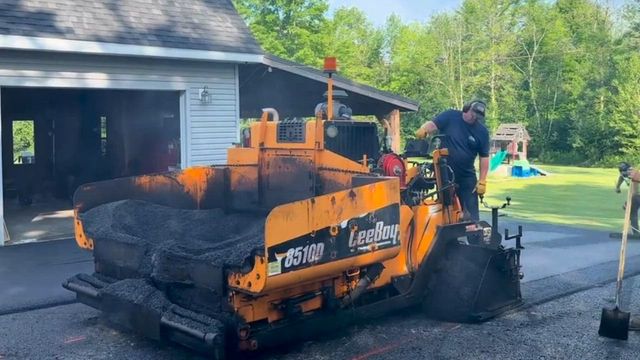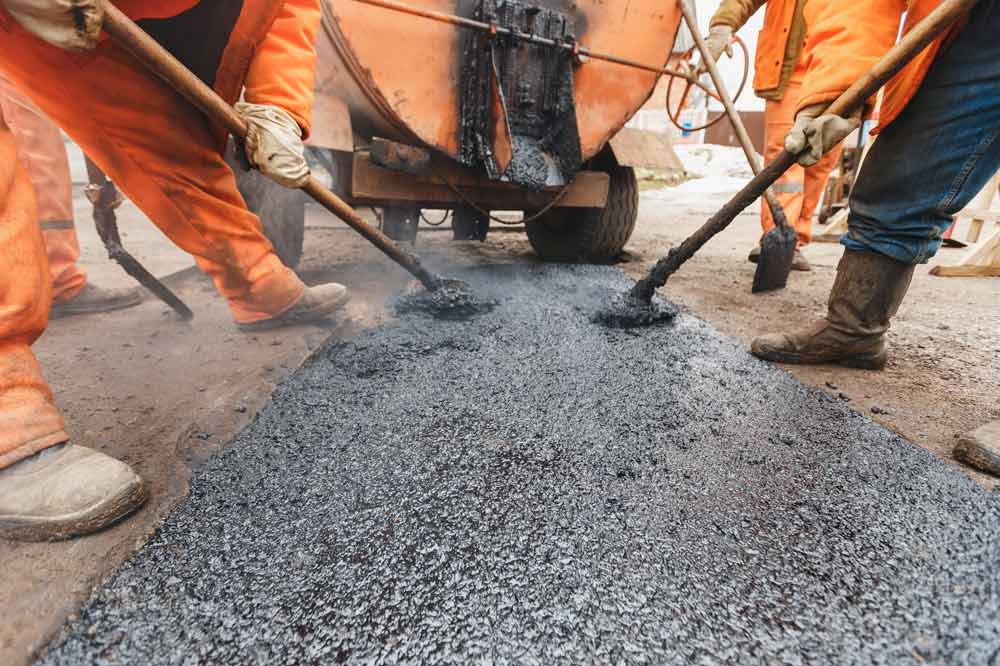Exploring the Various Sorts Of Asphalt Paving and Their Benefits
From the robust qualities of Warm Mix Asphalt to the environmentally friendly attributes of Recycled Asphalt Sidewalk, recognizing these options can substantially influence job outcomes. Innovations such as Warm Mix Asphalt and Porous Asphalt present added layers of efficiency and sustainability.
Warm Mix Asphalt
When thinking about one of the most effective leading options, warm mix asphalt (HMA) stands out as a top selection for several applications (paving). HMA is a versatile paving material understood for its resilience, versatility, and total efficiency. It is produced by home heating asphalt binder and incorporating it with aggregates at high temperature levels, ensuring an uniform mix that can endure numerous ecological problems
Among the main benefits of HMA is its ability to provide a smooth, skid-resistant surface, enhancing safety for vehicles and pedestrians alike. Furthermore, HMA shows superb resistance to deformation, making it ideal for high-traffic locations such as freeways and vehicle parking lots. Its flexibility to various climates further adds to its extensive usage.
The installation process of HMA is relatively fast, permitting efficient task completion with minimal disturbance to website traffic. In addition, it can be recycled, minimizing waste and promoting sustainability within the building and construction industry. Generally, hot mix asphalt continues to be a leading option for leading professionals due to its robust performance qualities and long-lasting cost-effectiveness, making it a trustworthy remedy for different framework demands
Warm Mix Asphalt
Warm mix asphalt (WMA) uses a cutting-edge alternative to hot mix asphalt, giving similar benefits while needing lower manufacturing temperatures. Commonly generated at temperatures in between 190 ° F and 250 ° F, WMA modern technology decreases power usage and greenhouse gas emissions throughout production, making it a much more environmentally friendly option.
Among the key benefits of WMA is its extended workability period. The lower temperatures enable a lot more efficient transport and positioning, especially in cooler weather conditions. This versatility can cause improved compaction and general toughness of the asphalt surface area. Furthermore, WMA can be utilized in various applications, varying from highways to domestic driveways, without jeopardizing efficiency.

The incorporation of ingredients or changed binders in WMA contributes to its improved homes, guaranteeing that it meets or surpasses efficiency requirements. WMA's decreased thermal influence throughout manufacturing can decrease the chance of damages to the surrounding environment, making it an attractive option for lasting paving techniques.
Cold Mix Asphalt
Cold mix asphalt is a functional paving service frequently used for short-lived repair work and low-traffic areas. This kind of asphalt is produced at ambient temperatures, making it a hassle-free option for quick fixes and tasks where standard warm mix asphalt may not be possible. The mixture normally consists of asphalt binder, aggregate, and additives, permitting it to continue to be practical for a prolonged duration.
One of the main benefits of chilly mix asphalt is its simplicity of application. It can be set up without specific devices, making it easily accessible for smaller sized contractors and DIY enthusiasts. Additionally, chilly mix can be used in various weather problems, which is especially helpful for immediate repair needs.

It may not offer the same long-lasting sturdiness as hot mix asphalt, its quick application and versatility make it an exceptional option for short-term services and low-traffic applications. In general, cool mix asphalt remains a practical choice in the asphalt paving landscape.
(read more)
Porous Asphalt
Permeable asphalt their website is an ingenious paving solution designed to boost stormwater monitoring and lower surface area overflow. This sort of asphalt features an one-of-a-kind structure that integrates interconnected spaces, enabling water to penetrate with the surface area and into the underlying layers. By facilitating natural drainage, permeable asphalt aids alleviate the risk of flooding and diminishes the concern on local stormwater systems.
Among the main advantages of permeable asphalt is its ability to boost water quality. As stormwater infiltrate the pavement, contaminants and sediments are trapped, reducing the variety of pollutants that go into regional rivers. This adds to healthier communities and supports compliance with environmental guidelines.
In addition, permeable asphalt can improve the long life of the sidewalk itself. By reducing water accumulation on the surface area, it decreases the possibility for freeze-thaw cycles that can bring about fracturing and damage. The reduced need for typical stormwater management infrastructure can result in expense financial savings for towns and designers.
Recycled Asphalt Sidewalk
(see details)Recycled asphalt pavement (RAP) represents a sustainable technique to highway construction and upkeep that benefits both the environment and the economic climate. By recycling existing asphalt materials, RAP minimizes the need for brand-new basic materials, which consequently saves natural sources and decreases ecological effect. This method reduces energy intake and greenhouse gas exhausts connected with the manufacturing of new asphalt.
The incorporation of RAP into new pavement combinations can likewise result in substantial expense financial savings. Contractors can leverage recycled products to decrease general project expenditures, making it an economically practical option for municipalities and private developers alike. In addition, RAP offers comparable efficiency characteristics to virgin asphalt, ensuring sturdiness and long life in road surfaces.
RAP's adaptability enables it to be used in different applications, including highways, car park whole lots, and property driveways. By enhancing the architectural integrity of existing sidewalks, RAP contributes to enhanced safety and level of smoothness of roadways.
Verdict
To conclude, the varied sorts of asphalt paving each deal distinctive advantages tailored to specific needs. Hot Mix Asphalt excels in toughness and fast setup for high-traffic areas, while Warm Mix Asphalt enhances sustainability via reduced power usage. Cold Mix Asphalt functions as an affordable alternative for urgent fixings, Porous Asphalt efficiently takes care of stormwater, and Recycled Asphalt Sidewalk advertises ecological duty. Collectively, these leading services add to efficient, green practices in the building industry.